Kate Rauner's Blog, page 79
November 25, 2015
Ancient Beauty of Sight – #poetry by Kate Rauner

Human eye with its weird blind spot at #14
Detecting light is useful
To aim leaves at the sun,
To orient when swimming,
To find, or hide, or run.
Sight drove the Cambrian explosion
Half a billion years ago,
A race of “see” with “be seen”
To tell a friend from foe.
From cells just photosensitive,
Many eyes were built.
Your eye is backwards, upside down,
But right-side out for squids.
A fruit fly has a compound eye,
A hundred little circuits.
A mollusk has a hundred eyes
To search the ocean currents.
The eye evolved before the brain,
For what’s a brain good for
Without a lot of inputs
To process in its core?
So you can think because you see
Reflections, motions, trends,
The beauty of our sunlit world
Through iris, nerve, and lens.
There’s grandeur in this view of life,
From so simple a beginning,
Endless forms most beautiful,
Life’s web continues spinning.
Recent reports on the Chitons sea mollusk with hundreds of eyes embedded in its shell got me thinking about the evolution of the eye – or, rather, eyes. That led me to a favorite quote from Charles Darwin, from the conclusion of On the Origin of Species (1859):
There is grandeur in this view of life, with its several powers, having been originally breathed into a few forms or into one; and that, whilst this planet has gone cycling on according to the fixed law of gravity, from so simple a beginning endless forms most beautiful and most wonderful have been, and are being, evolved.
There are lots of articles on evolution of the eye. For example, here and here.
Filed under: Poetry Tagged: blind spot, Cambrian Explosion, Charles Darwin, Chitons sea mollusk, evolution, evolve, eye, photosensitive, sight








November 21, 2015
Eat Like a Martian – Mealworm Snack :) #Mars #MarsSurvivalTips

Oops – oil and bok choy here – not on the early Mars missions
In my new book, Glory on Mars, settlers raise their own food. What would you take on a on-way journey to Mars?
You’d bring enough dried, compressed, packaged food to survive for a while, but living on Mars means growing your own.
Protein and Fat
Even on Earth, some people question the sense of raising large animals for food. There will be no cattle, pigs, or chickens on Mars – think of the mess on the spaceship to transport them! Not to mention having to grow hay or corn to feed them before they become food for people.
But insects – there’s an idea. Easy to transport – the eggs can probably be frozen. There are many places on Earth where people already enjoy insects, and maybe that’s what settlers should take to Mars.
How about mealworms? The name says it all. Just share your potato crop with them.
Mealworms for Snacking (Protein and Fat)
~ Collect mealworms (Darkling beetle larvae) of good size and vigor in a container with a breathable lid. Add parsley or other herb to the container – as they eat the herb, it flavors them – so I’m told.
~ After two days, remove all food from the worms for two more days so they can – yuck – purge anything nasty from their bodies. Remove any dead worms. Feed them to the fish you need for supper.
~ Humanely dispatch your worms by freezing them for two days.
Boil the frozen worms for 3 minutes. Drain and pat dry. Recycle the used water in your garden.
Toast worms in a pan over low heat until golden brown.
Serve warm.
Thanks to groundtoground for inspiration. The recipe sauteing mealworms with chili peppers and garlic in butter sounds great, too, but that will have to wait for future missions to Mars.
Totally Earthbound Note
High-school student discovers bacteria that enables mealworms to digest 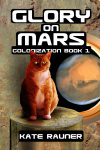 Styrofoam.
Styrofoam.
Mealworms can apparently subsist on a diet of foamed polystyrene, better known as Styrofoam. There won’t be much of that on Mars – though here’s a great way to recycle whatever there is – but could this help with recycling onEarth? csmonitor
See Kate’s Books, Amazon, or any of the major on-line retailers. If you can’t find my ebooks, try Smashwords.
Filed under: Kate's Books, Neat Science News, Science Fiction Tagged: colonize, colony, fat, food, mars, Martian, mealworm, polystyrene, protein, recipe, recycle, settlement, space, Styrofoam








November 20, 2015
Sand Dunes on #Mars are Different – a first for #NASA :)
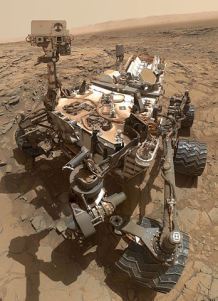
Look at its wheels – not a sand dune
No Mars rover has ever climbed a sand dune – only small drifts – but Curiosity is about to try. Martian dunes are active – they move, almost flow across the surface. That takes wind, but the thin atmosphere of Mars doesn’t pack much of a wallop (despite the storm that opens The Martian.)
In my #scifi book Glory on Mars, I claim that wind is sorting sand dunes on the Tharsis Plain. (Geek alert: “sorting” describes the distribution of grain size in sediments). My settlers sinter the uniform sands of Tharsis into construction stone for their habitat – they want well-sorted sand.
Perhaps NASA will find out if I’m right. Though Curiosity is in Aelois, two Martian Quadrangles away from Tharsis, so I guess I can always claim my sand is different.
The rover is moving slowly towards Dune 1 – 200 yards to go – good luck Curiosity.
Thanks to newsledge.com
Filed under: Kate's Books, Neat Science News, Science Fiction Tagged: Curiosity, geological sorting, Glory on Mars, Mount Sharp, NASA, rover, sand dune, science fiction, SciFi








November 19, 2015
#scifi Rover Inspired by Classic Lost in Space Chariot #MarsSurvivalTips
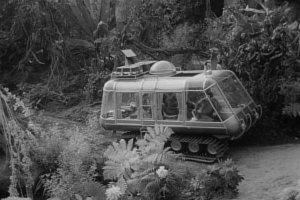 I give my Martian settlers a pair of pressurized rovers in Glory on Mars, classic pieces of science fiction equipment for exploring planets. As the movie The Martian shows, NASA is planning pressurized vehicles for their human exploration of Mars, too. It’s an obvious need on a frozen, nearly airless world.
I give my Martian settlers a pair of pressurized rovers in Glory on Mars, classic pieces of science fiction equipment for exploring planets. As the movie The Martian shows, NASA is planning pressurized vehicles for their human exploration of Mars, too. It’s an obvious need on a frozen, nearly airless world.
The Chariot
I had a classic scifi rover in mind as I wrote: The Chariot from Lost in Space, which was based on a Snowcat. A boxy shape seems perfect. Martian air isn’t dense enough for a vehicle to need streamlining, and a cuboid shape offers the most interior space on a pair of treaded tracks. My rover can be driven by the colony’s Artificial Intelligence and be tracked by a satellite system – advantages the Robinson’s of Lost in Space never had.
The Chariot has more windows than I gave my settlers, and I had to fit in an airlock and life support systems. But I still like the look of the old classic.
See more about my books here. In Glory on Mars, settlers take a one-way  journey to Mars, and that may be a mistake. It’s vital for them to explore in their robotic rovers – they need to find minerals if the colony is to succeed. But that’s not as easy as it sounds, even surrounded by the immense dead volcanoes of the Tharsis Plain.
journey to Mars, and that may be a mistake. It’s vital for them to explore in their robotic rovers – they need to find minerals if the colony is to succeed. But that’s not as easy as it sounds, even surrounded by the immense dead volcanoes of the Tharsis Plain.
Wikipedia has more on the Lost in Space TV series. And there’s a Lost in Space wiki here.
Filed under: Kate's Books, Science Fiction Tagged: AI, Artificial intelligence, chariot, colonization, colony, Lost in Space, mars, robotic, rover, settle








November 18, 2015
Einstein’s Stardust – #Poetry by Kate Rauner #star
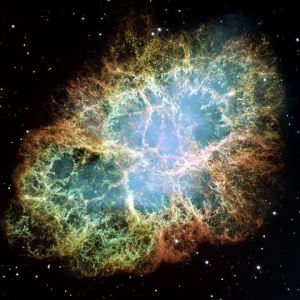
Stardust escapes a supernova
You may only know him
As the world’s most famous geek.
Einstein’s fame depends upon
A formula we can repeat
E = m c-squared
Your GPS just won’t work
Without his time dilation.
Satellites far above
Use relativity’s foundation.
If you like the gleam of gold
It’s re-emitted photons
That shift the sunlight’s frequencies
To yellow-reds we dote on.
Relativity explains
Light moves at finite speed.
If it were instantaneous
There’d be no light to see.
But it’s in supernovas
Where relativity
Overcomes quantum effects,
Creates the stardust,
To make,
You,
And me.
For a quick run through relativity in everyday life, see livescience.com
Filed under: Poetry Tagged: Albert Einstein, General Relativity, GPS, satellite, shiny gold, star dust, star light, supernova, time dilation








November 14, 2015
Eat Like a Martian :) – Fish Supper #MarsSurvivalTips #scifi #Mars

Oops – where’d that rice come from? My colonists don’t have any.
The first colonists on Mars take a one-way trip – is that a mistake?
While we wait for the answer – what’s for supper?
My new science fiction book, Glory on Mars, explores what life will be like on the red planet. There’s exploration and danger. There’s also supper – recipes below.
I give my first settlers cylinders of macronutrients they can extrude through a 3-D printer into shapes for variety, but that’s not very satisfying and the supply is limited. Vitamin pills are relatively lightweight, but I don’t think our Martian cousins should depend on Earth shipping them pills forever.
If they don’t want to starve, Martians will grow their own food – and if they don’t want scurvy, pellagra, and rickets to make a comeback, that food needs to be healthful.
Ya gotta eat to live, but food must provide pleasure and comfort.
What to grow on Mars
For protein I give my first settlers tilapia – an easily farmed but very mild white fish – and mealworms. Also seeds and starter plants – potatoes, tomatoes, squash, salad greens, and herbs. Chives, thyme, lovage (which tastes like celery), and parsley seem essential to me.
What herbs would you take to Mars?
Imagine you spent a long hard day replacing gaskets and filters in the recycling system. You’ve worked in cramped quarters, your back aches, and you’re hungry. Grumpy-hungry.
Fortunately, one of your teammates has cooked supper. Here’s what you sit down to.
Supper for Four Settlers
Poached Tilapia (Protein)
~ 4 tilapia fillets
~ Chopped parsley – lots
~ 4 tomatoes – sliced or dices as you prefer
~ Salt (You know, salt’s another thing to worry about on Mars. Especially once children are born and the population grows, you can’t rely on recycling human waste – yuck – to harvest enough salt.)
Arrange fillets in a baking dish. Sprinkle with parsley. Cover with tomatoes. Add enough water to cover the bottom of the dish. Cover baking dish.
Bake or microwave until fish is opaque and flakey. Check and add more water if it boils away in the cooking. Serve with salt and more parsley to taste.
Thanks allrecipes for the idea. Sorry – no lemon or oil on Mars yet.
Nuked Potatoes (Calories)
~ 4 large or 8 small potatoes
~ Chopped herbs
Prick potato skins all over. Microwave until done – fork tines will slide easily into to the center. Serve with choice of herbs – I like chives and thyme. Some potato varieties are a bit dry, so mash in water and wish you had milk.
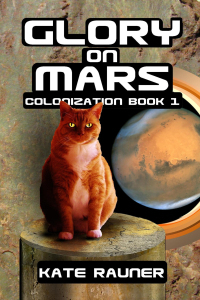
Available at Amazon, B&N, Kobo, Apple and all your favorite on-line retailers
Salad (Vitamins)
Wash and dry a selection of greens and herbs. Serve raw. And plain. Sorry, no salad dressing yet on Mars.
Would that leave you happy and content? What herbs do you think are vital to cooking?
See Kate’s Books, Amazon, or any of the major on-line retailers. If you can’t find my ebooks, try Smashwords.
Filed under: Kate's Books, Science Fiction Tagged: calories, colonize, colony, food, mars, Martian, potato, protein, recipe, salad, sciece fiction, SciFi, settlement, space, tilapia, vitamins








November 11, 2015
Galactic Year – a #SolarSystem #poem by Kate Rauner

Impact!
As our sphere orbits Sun,
So Sun orbits Black Hole
At the center of our galaxy,
As eternity unfolds.
In a quarter billion earthly years
Our solar system circles round,
Weaves thru the mid galactic plane
Where other stars are densely found.
Fifteen times since life began
We have circum-rotated,
And ten times in each orbit grand
The planet’s devastated.
Our Sun’s own cloud of comets
On the solar system’s edge
Are jostled from their sedate paths,
Fall inward from their ledge.
With corresponding timing
Ancient craters have been found.
It seems Earth’s plagued with comet storms
As the cosmic year spins round.
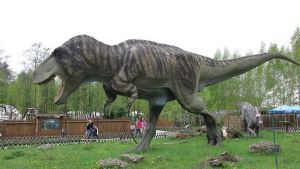
Life sized model
Bombardments are not good for life.
Half a dozen times
Mass extinctions cleared our world
As doomsday peals chimed.
Things have been quiet for some time
Since dinosaurs disappeared.
The Sun careens past cosmic dust,
Dark matter, stars, and fears.
Such grand cosmic motion can only be estimated, and the number of Earth’s mass-extinctions depends on your definition, but our movement through the galaxy makes me feel very small and oblivious.
space.com on extinctions and comet strikes
Wikipedia on Galactic year
Filed under: Poetry Tagged: black hole, comet, cosmic year, dinosaur, galactic year, impact, mass extinction, Oort Cloud, orbit, solar system, sun








November 10, 2015
Glory on #Mars #ScienceFiciton #Book Available at More Sites
Woo hoo! Glory on Mars is working its way into more on-line  sites. It’s on Amazon now and should be at your favorite on-line retailer, too. It’s fun, as an author, to watch the book turn up in more places. You can download a free copy – check it out here.
sites. It’s on Amazon now and should be at your favorite on-line retailer, too. It’s fun, as an author, to watch the book turn up in more places. You can download a free copy – check it out here.
A one-way journey to Mars may be a mistake.
Colonization of Mars is in trouble when the colony psychologist, one of the first eight settlers, commits suicide. Four more settlers are now on their way, bringing renewed hope – and a cat. Emma volunteered so she could explore Mars in her robotic walkabout suit. Even if she gets the chance, that may not make up for everything she left behind. Mars is a hostile planet, danger follows from Earth, and an inexplicable sense of desolation cripples the settlers’ efforts. Read this first book in the On Mars series to discover if humans survive on Mars. Would you go?
Filed under: Neat Science News








November 7, 2015
Glory on #Mars #ScienceFictionBook New Release
 My latest book is available today here. Over the coming week it should turn up on Amazon and other on-line retailers. Hurray – now I can take a rest.
My latest book is available today here. Over the coming week it should turn up on Amazon and other on-line retailers. Hurray – now I can take a rest.
A one-way journey to Mars may be a mistake.
Colonization of Mars is in trouble when the colony psychologist, one of the first eight settlers, commits suicide. Four more settlers are now on their way, bringing renewed hope – and a cat. Emma volunteered so she could explore Mars in her robotic walkabout suit. Even if she gets the chance, that may not make up for everything she left behind. Mars is a hostile planet, danger from Earth follows them, and an inexplicable sense of desolation cripples their efforts. Read this first book in the On Mars series to discover if humans survive on Mars.
Download a FREE copy in any of the major formats from Smashwords. Use Coupon Code XY35L here.
If you’d like to say thanks, consider posting an honest review on your favorite retail site – I’m on all the major sites, so just search on my name or the book title – or wherever you hang out to talk about books. Reviews help people find my books, so I appreciate your time. Thanks.
Filed under: Kate's Books, Science Fiction Tagged: colonization, colony, mars, Red Planet, science fiction, SciF, settle








November 4, 2015
#Colonization on #Mars
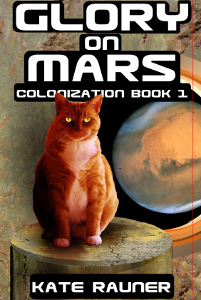 I’ve been working through the final edit of my new novel – Glory on Mars. I’ll release it this weekend!
I’ve been working through the final edit of my new novel – Glory on Mars. I’ll release it this weekend!
The Mars colony is in trouble when their psychologist, one of the first eight settlers, commits suicide. Four more settlers are on their way, bringing renewed hope – and a cat. Emma volunteered so she could explore Mars in her robotic walkabout suit. Even if she gets the chance, that may not make up for everything she left behind. Mars is a hostile planet, danger from Earth follows them, and an inexplicable sense of desolation cripples their efforts. Read this first book in the On Mars series to discover how humans survive on Mars.
I’ve fussed over the cover image – the settlers take a cat with them, and the cat plays a pivotal role in the story, but is not the central figure. I like the idea of including a cat on the cover – the first image I tried was too cute, the second too complacent. My latest effort is shown here. I hope the eyes will catch a person’s attention as they scan through thumbnail book covers. Would you click on this #ScienceFictionBook cover to read a description?
Thanks for reading. Subscribe to receive occasional email about my books, or visit here for the latest.
Filed under: Kate's Books, Science Fiction Tagged: cat, colonization, colonize, colony, cover, ebook, mars, Martian, novel, science fiction, SciFi, settler, space, spaceship











